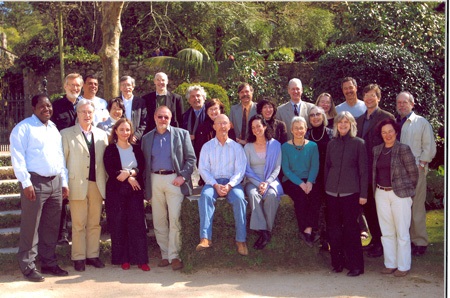Ritual Communication
Date
Mar 16-23, 2007Organized by
Ellen B. BassoLocation
Hotel Palácio de Seteais, Sintra, PortugalPublications
Ritual Communication, edited by Gunter Senft and Ellen B. Basso. Berg Publishers: Oxford. 2009.Participants
- Felix K. Ameka (Leiden University, The Netherlands
- Ellen B. Basso University of Arizona, USA
- Richard Bauman Indiana University, USA
- Charles L. Briggs University of California-Berkeley, USA
- Antonio José B. da Silva University of Arizona, USA
- John W. Du Bois University of California-Santa Barbara, USA
- Nick Enfield Max Planck Institute for Psycholinguistics, The Netherlands
- Maurizio Gnerre University of Naples, Italy
- Cliff Goddard University of New England, Australia
- John B. Haviland University of California-San Diego, La Jolla, USA
- Katherine Hirschfeld University of Oklahoma, USA
- Ingjerd Hoëm The Kon-Tiki Museum, Norway
- Sachiko Ide Japan Women's University
- Corinne A. Kratz Emory University, USA
- Joel Kuipers George Washington University, USA
- John A. Lucy University of Chicago, USA
- Victoria Malkin Wenner-Gren Foundation, USA
- Suzanne Oakdale University of New Mexico, USA
- Gunter Senft Max Planck Institute for Psycholinguistics, The Netherlands
- Michael Silverstein University of Chicago, USA
- Wolfgang Wickler Max Planck Institute for Behavioral Physiology, Germany
ORGANIZER’S STATEMENT: Ritual communication, our original topic, elicited papers of great variety and interest from scholars from various parts of the world with varied theoretical orientations. Their contributions were all based on empirical data gathered during anthropological-linguistic field research. These papers made clear how the speech-centeredness of ritual practice has profound consequences for social life both in the immediate present and over historical time. The functionalist understandings in earlier anthropological approaches to “ritual communication” were subjected to a severe critical scrutiny. As participants examined the voices of ritualized sociality from socio-cultural and linguistic anthropological perspectives, what became most interesting to us all were the issues surrounding ritualization as process with historical consequences: how images of sociality are foregrounded through recontextualizing communicative practices that dispute, reinforce, or elaborate such images.
Particularly intense discussion arose regarding four general problems: 1) the individual practice and experiencing of ritualized speech as both self-reflexive and as reflexive engagement with others; 2) the connections between micropolitical (e.g., local; kin based) and macropolitical practices (e.g., within multi-sited nationalist; and virtual communities); 3) ritualized metasemiosis, or how humans (including anthropologists) model and claim or dispute the value of ritualized meaning; and 4) the problem of how to understand evolutionary “benefit.” With regard to these four theoretical problems, ritually reconfigured and ritually communicated experiences of modernity, neoliberal practice, and globalization stood out as important new contexts for research.
Wenner-Gren Symposium #137
